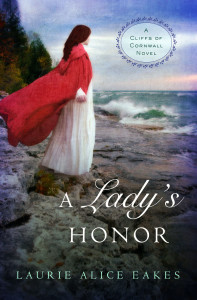Vanishing Cornwall, The Book behind the Novel by Laurie Alice Eakes
Once upon a time, I read a book called Jamaica Inn by Daphne DuMaurier. It was swashbuckling romance with smugglers and a dashing, dangerous hero and nasty villains and I was enthralled. And the setting was Cornwall, a land given to such dark, romantic adventures. A few years later, I was visiting my sister and picked up a book called Demelza by Winston Graham. This is the second book in an epic historical series set in Cornwall. More adventures and romance, danger and dark deeds filled my reading hours as I worked through the series. And learned more of this land that claims it is the birthplace of King Arthur.
Wanting to know more, I went to the library for books on Cornwall and discovered Vanishing Cornwall by the author of Jamaica Inn. She also wrote the book behind The Birds, that creepy Alfred Hitchcock movie that gave me nightmares for weeks after watching it. Her most famous book is probably Rebecca, a gothic novel at its best and most disturbing.
But I digress…
In Vanishing Cornwall, DuMaurier gives us a history of the lore and romance and true history of this peninsular county of England. Her beautiful writing fired my imagination, and The Cliffs of Cornwall series was born.

Cornwall is the western most point in England. It points a finger into the Atlantic Ocean, with the English Channel to the south and The Irish (Celtic) Sea to the north. The county of Devonshire is to the east. The north coast of Cornwall is soaring cliffs and thousands of caves, rocky beaches and pounding surf. In other words, this harshly beautiful land is far removed from the Regency world of Georgette Heyer or even Jane Austen. The gentry enjoyed their entertainments, young women sought husbands, and all the other trappings of the time, and yet poor roads and distances lowered the frequency. A smaller population limited the choices of appropriate spouses. If they could afford it, the upper classes, the landed gentry and noblemen, traveled to London, but it was a long journey taking as much as two weeks with rather difficult travel conditions.
And Cornwall was not a wealthy county for the most part. Mining and fishing are the primary industries at the time of my story, 1811. Both were a poor way to make a living. Mines petered out and families went hungry. Sometimes the pilchards didn’t run and the stew pots offered up thin fare. To supplement these meager forms of subsistence, men—and likely a few women, even those of the landed classes—turned to the lawlessness of smuggling.
Smuggling was a serious crime. A man could be hanged at worse and jailed in England at best if they were caught. Usually they faced transportation to the penal colony of New South Wales—Australia. To protect themselves, they maintained a code of silence. A man simply did not tell anyone who was involved. If he wasn’t punished by the revenue officers and courts for being involved himself, he would be punished by his peers and more seriously. Too often the punishment was death.
When one’s family was starving and one’s roof leaking in a time before safety nets like food and housing subsidies existed, do we condemn people for engaging in this lawless activity?
You can answer that question, or answer this: Do you like stories set in the ballrooms of London or the more open setting of the countryside?
Originally posted 2014-04-28 10:00:00.
Comments are closed.